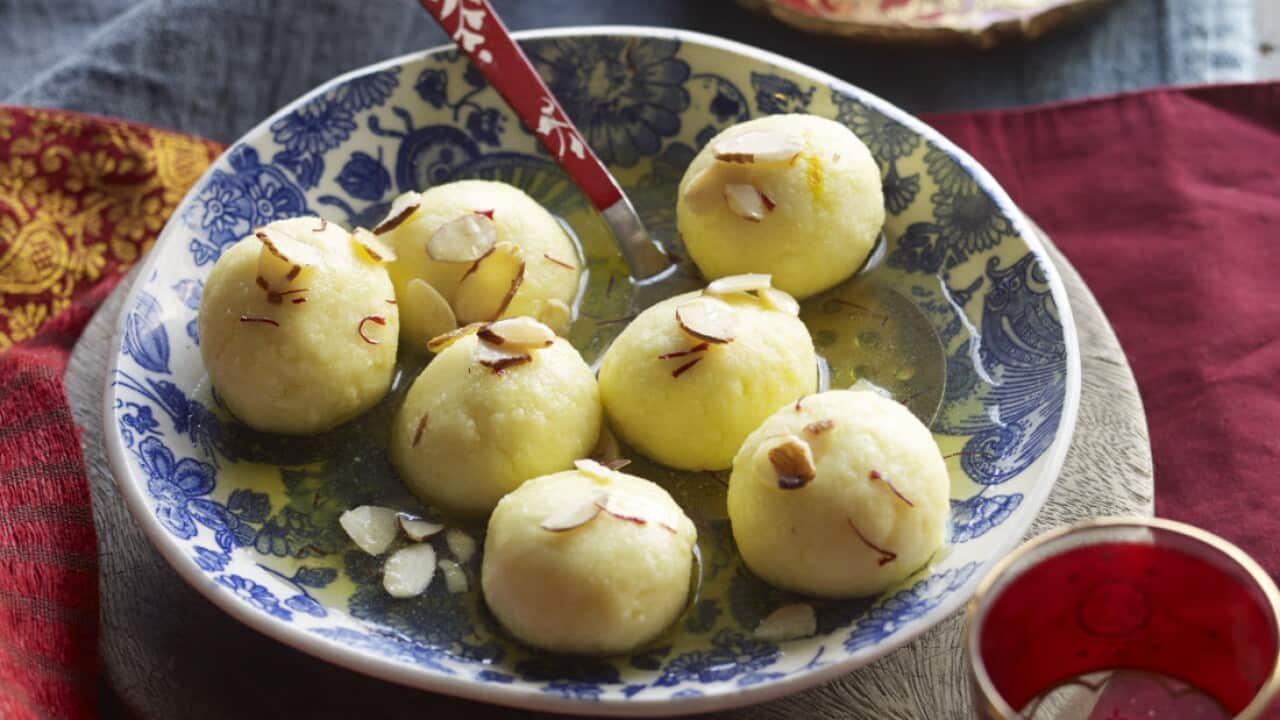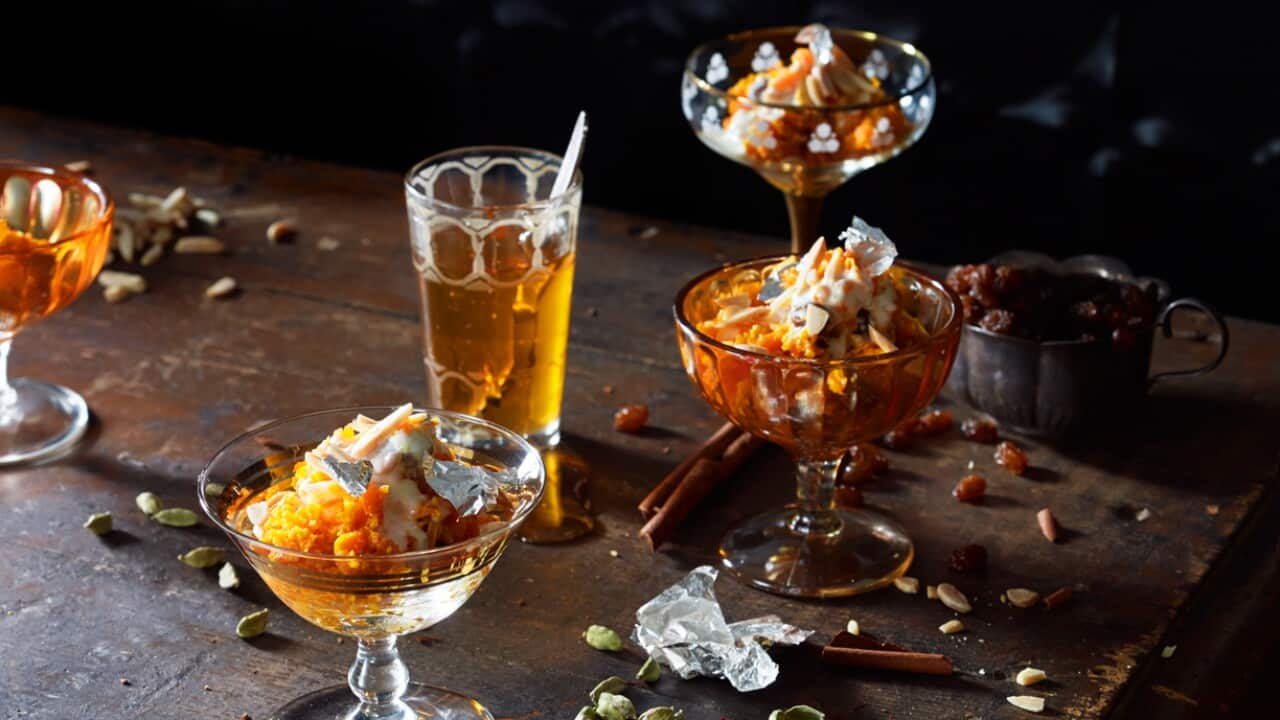If you have a sweet tooth, there are few pleasures as satisfying as biting into your first-ever . The much-loved dessert was invented in the temples of West Bengal nearly 700 years ago and popularised by the Calcutta confectioner Nabin Chandra Das in the 1860s. It’s also a lesson in flavours and textures: a spongy exterior, made from semolina and cheese curds, is steeped in a sugary syrup and laced with rosewater and cardamom. For Mukesh Sapra, co-owner of Billu’s, a long-running restaurant in Sydney’s Harris Park, this dangerously addictive sweet is synonymous with Diwali.
The Festival of Lights celebrated by Hindus, Jains and Sikhs is an ode to Lakshmi, the goddess of wealth and prosperity and is a celebration of the triumph of good over evil. To exchange Indian sweets or mithai with your loved ones during Diwali is to shower them with blessings for the coming year.
“Rasgulla literally means ‘ball full of syrup’ in Bengali – it’s traditionally made by Bengalis and it melts in your mouth, so if you don’t have teeth, it doesn’t make a difference,” laughs Sapra, who is from Ambala in the Indian state of Haryana and joined Billu’s last year. “At Billu’s, we make rasgullas fresh on the same day and sometimes we add dressings like ground pistachios. During Diwali, we visit our friends and our families and celebrate on the streets. Back home in India, everyone gives each other sweets weeks in advance for [Diwali]. I have a circle of thirty to forty friends, so you can’t [buy your] sweets last minute!”
“At Billu’s, we make rasgullas fresh on the same day and sometimes we add dressings like ground pistachios. During Diwali, we visit our friends and our families and celebrate on the streets. Back home in India, everyone gives each other sweets weeks in advance for [Diwali]. I have a circle of thirty to forty friends, so you can’t [buy your] sweets last minute!”

Billu's rasgullas. Source: Billu's Restaurant Sydney
Nowadays if you go to India it doesn't matter which city you are in, the shops offer a very wide variety...
Prakash Revu is the founder of Sweet India, a long-running Indian sweet shop in Melbourne’s Hoppers Crossing. Revu, who immigrated to Melbourne from the port city of Visakhapatnam in Andhra Pradesh in 1997, says that historically Diwali customs changed depending on where you are from across India, a fact reflected in the local sweets.
“Nowadays if you go to India it doesn't matter which city you are in, the shops offer a very wide variety,” he says. “You can get sweets with a cashew base, a flour base, a milk base and a traditional base – so we brought a similar concept to Melbourne.”
Some sweets, he says, are universally loved across India. The laddoo, a sphere-shaped sweet made from flour, milk, ghee and sugar is a case in point. Sweet India makes a range of laddoo including the boondi laddoo, a popular sweet made from boondi, the Hindi word for 'drop', used to describe small droplets of gram flour and water that are later fried and soaked in sugar, water, cardamom and saffron. Get this recipe for .
Get this recipe for .

Chickpea flour sweets (besan ladoo). Source: Tanvi Srivastava.
"[Boondi laddoo] is popular in the southern parts of India - you strain the batter into hot oil or ghee and then you add your sugar syrup and your nuts,” he says. “Or, if you want to make a special laddoo, you can put some dry fruits and then roll it with your hand. Every region in India sells laddoo in different shapes and colours.”
In Melbourne, Revu prepares all year for Diwali.
"[In Australia] Diwali is becoming more common,” he says. “Even if you go into the corporate world and offices, almost everybody is celebrating Diwali nowadays.”
Abhi Kohli from a Sydney-based wholesale sweet shop, Pure Desi also agrees with this observation. For the last few years, Kohli has been helping his father with the family business, which specialises in contemporary versions of traditional Indian sweets. He says that the ritual of exchanging sweets during Diwali isn’t just a hallmark of older Indian Australians. He says that the act of gifting sweets to friends and relatives is also flourishing among the younger generation making the tradition their own.
“There are a lot of people in Australia keeping this tradition alive, a lot of Indians have family and friends [across the country],” he says. “It starts from Raksha Bandhan [a Hindu festival that celebrates the bond between siblings] and although the older [generation] are our regular customer base, I see the younger generation [taking part] the most in the gifting.”
Fittingly, Pure Desi’s imaginative spin on Indian sweets features sleek packaging, rainbow-bright textures and of-the-moment ingredients. Take barfi, a dense, milk-based sweet that’s often sliced into diamonds or triangles and covered in edible silver foil.
“Barfi is universal throughout India, so we can get experimental,” he says. “We offer traditional flavours such as almond and pistachio and rose, but we also offer popcorn barfi and taro barfi for the customers who want something different. I think the [tradition of exchanging sweets] is going to stay strong and keep growing and growing.”
62 Wigram St, Harris Park NSW
1-3 Kilmur Rd, Hoppers Crossing VIC
1/6 McCormack St, Arndell Park NSW 2148, Australia










